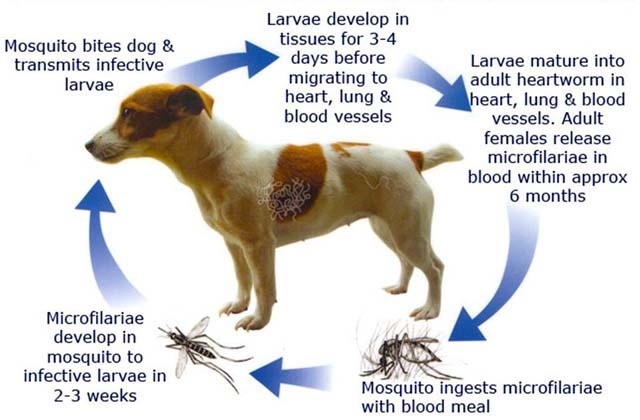Heartworms are parasites that are able to live inside the arteries of the lung and chambers of a pet’s heart and feed on surrounding blood. In severe cases heartworms can grow up to 30cm long and 2cm thick in populations of over 200. The offspring of a heartworm are more commonly referred to as Microfilariae, which can be found in the blood of an infected pet.
HOW IS HEARTWORM DISEASE SPREAD?
The disease can only be spread between pets by mosquitoes. When a mosquito bites and feeds on the blood of an infected pet it ingests microfilariae. The mosquito becomes a host while the microfilariae mature. When the same mosquito bites another pet it infects the healthy pet with heartworm larvae. The larvae migrate through the pet’s tissues and circulatory system, eventually reaching the heart and lungs where adult worms grow and reproduce.
Why is heartworm disease dangerous?
Although the heart, liver, kidneys and general circulation may all be affected, heartworm is primarily a disease of the lungs. A pet’s body reacts to the presence of the worms in the blood vessels, resulting in clot formation, bleeding through vessel walls, and inflammation of surrounding lung tissues.
The severity of the disease depends upon the amount of lung damage and how a pet’s immune system responds. Although related to worm numbers, it is more a function of the individual dog’s reaction to the parasite. Each case of heartworm is, potentially, different.
The Heartworm Lifecycle (5-6 months)

Image courtesy of Novartis Animal Health
How can you tell if a pet is infected? What are heartworm disease symptoms?
Heartworm disease symptoms include:
- Dry and persistent cough
- Lack of stamina when exercising
- Weight loss
- Dry coat
- Listlessness or weakness
In more advanced cases there may be heart failure, distressed breathing, a distended abdomen, severe damage to internal organs, and sometimes collapse from sudden destruction of a pet’s red blood cells. It is important to appreciate that this potentially fatal disease usually slowly. By the time an infected pet starts to show symptoms, at least half of the pet’s lungs are involved: hence the importance of early diagnosis and prevention.
A blood test is the best way to tell if your pet has heartworm disease.
What should I do if my pet is showing symptoms of heartworm disease?
If you suspect that your pet may be affected by heartworm diease please contact your local vet as soon as possible, there are treatment options available, however this needs to be carefully managed by a veterinarian.
What type of pet is most susceptible to heartworms?
Dogs, cats and even ferrets are susceptible to heartworm however infection is much more common in dogs. Your pet’s breed, sex, or age does not make a difference in prevalence of heartworm disease.
Where are heartworms?
Heartworm disease has been found in pets throughout mainland Australia in both cats and dogs.
How can you prevent heartworm?
There are many products available for heartworm prevention. The best option is one that suits your lifestyle and is the most convenient and thereby safest for your pet.
A ‘once a year heartworm injection’ known as Proheart is a very convenient method of protection. Proheart is administered by your vet and will remove the risk of you forgetting daily or monthly dosing. Monthly heartworm preventatives and treatments include spot on treatments and chewables which also incorporate other forms of parasite protection for fleas and worms.
When to start heartworm prevention
Puppies should begin heartworm prevention by at least 3 months of age. After this age your veterinarian will need to perform a blood test to see if your pet is heartworm free. Some nasty side effects can occur if a dog is already infected with heartworm disease when prevention is given.
Total Wellness Plan
Did you know we can provide you with 12 months of heartworm prevention direct to your door? As part of the Total Wellness Plan, an annual healthcare plan for pets, we provide unlimited consultations*, annual vaccinations, monthly parasite control delivered direct to your door and much much more. Join the Total Wellness Plan and start saving on pet care all year round.
*For Classic plan members only.











